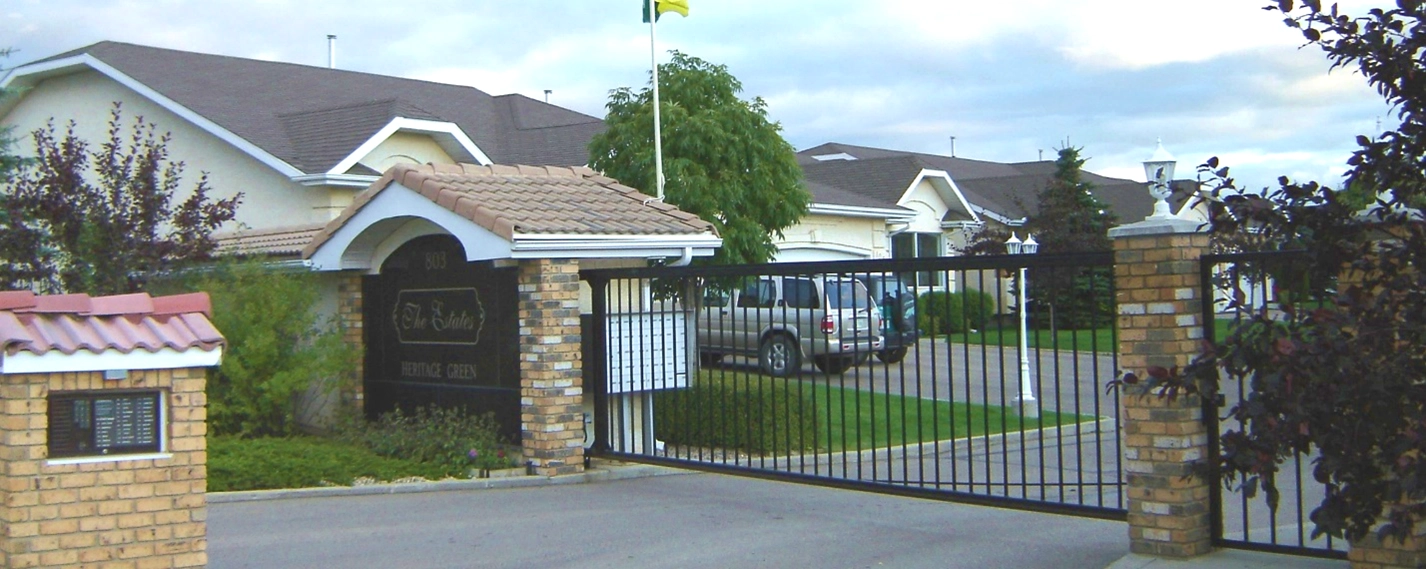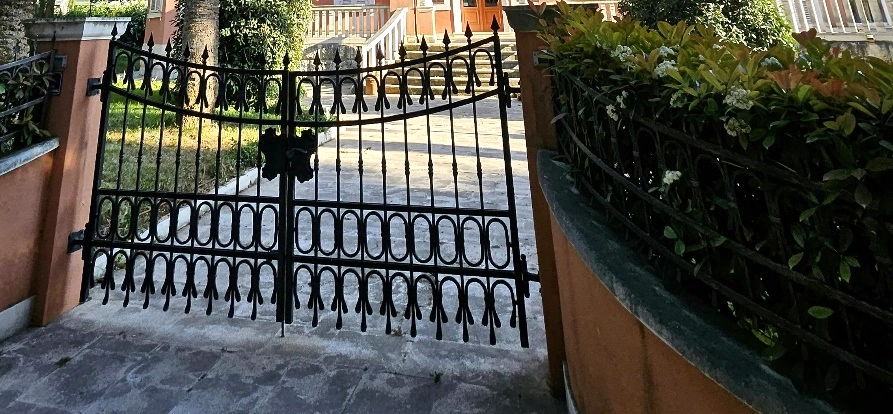
Gated communities are just what the phrase suggests. The entrances are closed. Typically, walls insulate the gated complex from the outer world. The front gate could be operated by a 24/7 security guard. Or access could be electronic.
These properties come in various styles. Most are urban or suburban. But they all share one trait. Units in gated communities appeal to people looking especially for safety, privacy, and quiet.
Thinking of buying into a gated community? Here are some things you should know — on both pro and con sides.
Draws and Drawbacks
Like any form of residential property, units in gated communities appeal to some people and not others. They have their benefits, and potential drawbacks.
On the plus side…
Want protection and privacy? A buffer against people who show up unannounced? Then you might opt for a gated community. Fewer pedestrians enter gated communities, and traffic is limited to the community’s residents and expected guests.
Some of these properties have elaborate landscaping, club houses, gyms — and even places to swim, jog, or play tennis or golf.
Home value appreciation can also be a draw. Gated communities could contain condos, townhomes, free-standing homes, or a blend. All forms of homes could be solid equity-builders. Potential buyers can check real estate sites for the history of sale prices in a given community, as well as comparable homes nearby, to check on financial performance. The properties that hold their value best over time are the ones that have large cash reserves, so they’re ready to handle unexpected situations.
Now, a few counterpoints…
A home in a gated community is likely more expensive than nearby regular homes are. So, financing could be more challenging.
Acquiring the deed means agreeing to certain rules, set by homeowners’ associations (HOAs). These self-governing associations elect residents as board members to oversee the common areas and establish covenants, conditions, and restrictions (CC&Rs) in the property deed. Some research has shown a correlation between gated properties and less diversity.
The board hires maintenance and property care teams to handle upkeep on the premises. While residents will not have to do yard work, there are fees for maintaining the property — gate and all. Deed holders pay monthly assessments to the association (and most offer autopay).
When budgeting for this purchase, the more amenities a community has, the higher the monthly dues. Make sure you take regular assessments and the potential for special assessments into account. Payments could be spread equally among all owners, or they could be based on unit size. Check the master deed (the blanket deed held by the association).
One more major factor is the gate itself. Entering the complex will take a bit of planning for non-residents. Appraisers and inspectors will need the code or advance clearance to pass the gates. So will real estate agents and service technicians. Remote access is becoming more common, yet residents may sometimes need to meet people or pick up packages at the gate. This is the tradeoff for gated privacy.
Features of the Deed

A buyer gets a deed to the unit. There is also a master deed, with CR&Rs and bylaws. Buyers receive copies.
Features of the property are categorized as either (a) the common elements available to all unit owners collectively, or (b) private property of the unit owner. Buyers get a shared interest in the common areas.
- Outer walls and roofs are common elements. So are the lands, the paved areas, pools, and so forth.
- Everything inside the interior walls is property of the individual unit owner. The walls themselves, though, should never be structurally altered without the HOA’s permission.
- The HOA holds a master insurance policy, and the unit owner holds a condo owner’s or homeowner’s policy.
- People buy and sell these units (and bid them up) just as they do with standalone homes. Financing requires individual unit inspections and appraisals.
When a gated community started out, the developer recorded the master deed and related documents with a plat that lays out common and individual elements.
Gated Communities Without HOAs?
This is very rare, and might not even be allowed by the state you’re considering buying into. Why? A core reason involves the roads inside the gates, and who maintains them.
Roads that belong to a gated community are private. They’re held exclusively for residents, their invited guests, and those carrying goods and services to them. Were they owned by the municipal government, then they’d have to be open to everyone.
Expect neighborhood watch volunteers to address speeding or noise. The role of police is typically limited. But police do respond to emergencies, DUIs, etc. And the local government will hold the property’s private roads to state transportation standards.
While it’s reasonable to assume a gated community has a homeowners’ association, there’s another common assumption that’s often wrong. Not all of these properties are financially exclusive fortresses. They can be made up of both primary residences and rented units. Typical income levels of the resident population can differ greatly by property.
Perfect for Retirees?
Gated communities appeal to people’s need for privacy and protection. Though a guarded front entrance never guarantees complete safety from unwanted disturbances, a key selling point of the gated community is safety.
And this means many of the deed holders could be seniors. Some gated properties are 55+ communities. Check for such restrictions and what they entail before deciding to buy in. And check out our article on the pros and cons of buying into an age-restricted property.
Some of these properties are resort-like in their level of amenities. Especially amenities that appeal to seniors: lifeguards and other support staff, movies, game nights, and opportunities for socializing with other residents in common spaces.
You can expect strict rules involving renting, pets, signage, outdoor décor, solicitations, smoking, and so on. Due diligence will help the buyer avoid unwanted surprises.
At the End of the Day
Every real estate decision involves tradeoffs.
An HOA can impose fines on units that fall short of rules and regulations of the property. The missteps of guests (unauthorized parking, smoking, and so forth) can also lead to fines. Fines can turn into liens that burden the owner’s title.
Yet many gated communities swear by those rules and restrictions as the key to keeping their property values up.
Local real estate agents can comment on the financial potential of a given gated community versus other options. Many communities have online reviews. These commentaries are also worth a look. Meeting with someone in the office, as well as a current unit owner or two, will reveal more things a buyer should know.
Please note: Each property is unique, with its own set of pros and cons. Readers should not consider this article legal or financial advice.
Supporting References
PenFed® Credit Union: Mortgage Knowledge Center – Seven Things to Know Before Buying in a Gated Community (updated Aug. 23, 2023).
Christy Bieber for The Motley Fool via NASDAQ.com: Pros and Cons of Buying a House in a Gated Community (Oct. 15, 2022).
Deeds.com: With Home Prices Soaring, Condos Are a Relative Bargain. Here’s How Their Deeds Work (Jun. 23, 2021).
And as linked.
More on topics: Fairness in housing, HOA red flags
Photo credits: Parihav, via Wikimedia Commons (CC-BY-SA 3.0), and Hert Niks, via Pexels/Canva.
